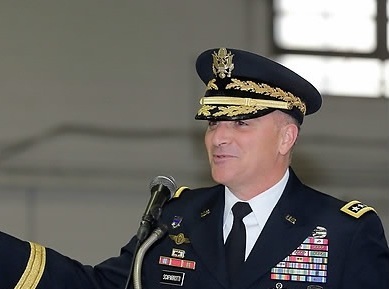USFK chief warns of N.K. surprise attack, fallout from U.S. budget cuts
By Korea HeraldPublished : April 3, 2014 - 20:41
WASHINGTON (Yonhap) ― The North Korean regime is so dangerous that it can attack South Korea with “little or no warning,” the top U.S. military commander on the peninsula said Wednesday after the two Koreas exchanged artillery shells across their western sea border this week.
Speaking before a congressional committee, Army Gen. Curtis Scaparrotti, leader of the U.S. Forces Korea, also voiced concerns about a possible impact to crisis management in Korea from the Pentagon’s budget cuts.
“The Kim Jong-un regime is dangerous and has the capability, especially with an increasing asymmetric threat, to attack South Korea with little or no warning,” he said at a hearing of the House Armed Services Committee.
North Korea has the fourth largest military in the world, with more than 70 percent of its ground forces deployed near the Demilitarized Zone and its long-range artillery capable of striking targets in Seoul and nearby areas, he pointed out.
Speaking before a congressional committee, Army Gen. Curtis Scaparrotti, leader of the U.S. Forces Korea, also voiced concerns about a possible impact to crisis management in Korea from the Pentagon’s budget cuts.
“The Kim Jong-un regime is dangerous and has the capability, especially with an increasing asymmetric threat, to attack South Korea with little or no warning,” he said at a hearing of the House Armed Services Committee.
North Korea has the fourth largest military in the world, with more than 70 percent of its ground forces deployed near the Demilitarized Zone and its long-range artillery capable of striking targets in Seoul and nearby areas, he pointed out.

His warning came as military tensions have escalated in Korea.
The regime recently test-launched a number of short-and medium-range rockets. It also fired hundreds of artillery shells toward the South’s waters on Monday (local time), prompting its massive artillery barrage in response.
Pyongyang also warned that it may conduct another nuclear test.
Scaparrotti, who has commanded the 28,500 American troops in Korea for half a year, said the North’s latest provocations are not surprising.
“This is a common strategy with North Korea, to come out of a period of calm and to use these types of actions to message to both the United States, the international community and South Korea, and also to demonstrate capability,” he said. “It’s the normal pattern of messaging his displeasure with our training, messaging their capabilities.”
The general emphasized that his troops, working with South Korea’s military, will be able to maintain normal operations despite U.S. defense budget woes.
“The Korean theater has enjoyed being the highest of priorities, right behind Afghanistan,” he said. “My concern, however, is in the follow-on forces, which if there is a conflict or an escalation of crisis on the peninsula, I rely on to be there quickly and to be ready.”
On the timing of transferring operational control (OPCON) of South Korean troops in the event of war, Scaparrotti indicated that no specific agreement will be announced before the annual defense ministerial talks between the allies in October.
The two sides are still in consultations over appropriate conditions for the transition after South Korea requested a further delay in the schedule. Under an existing deal, South Korea is supposed to regain OPCON as of December 2015.
But South Korea’s military says it needs more time for preparations such as acquiring more advanced weapons and establishing a new command system.
Seoul and Washington would weigh the issue with a goal of reporting back at the Security Consultative Meeting in October, Scaparrotti said.
-
Articles by Korea Herald







![[From the Scene] Monks, Buddhists hail return of remains of Buddhas](http://res.heraldm.com/phpwas/restmb_idxmake.php?idx=644&simg=/content/image/2024/04/19/20240419050617_0.jpg&u=20240419175937)








![[From the Scene] Monks, Buddhists hail return of remains of Buddhas](http://res.heraldm.com/phpwas/restmb_idxmake.php?idx=652&simg=/content/image/2024/04/19/20240419050617_0.jpg&u=20240419175937)

![[KH Explains] Hyundai's full hybrid edge to pay off amid slow transition to pure EVs](http://res.heraldm.com/phpwas/restmb_idxmake.php?idx=652&simg=/content/image/2024/04/18/20240418050645_0.jpg&u=20240419100350)

![[Today’s K-pop] Illit drops debut single remix](http://res.heraldm.com/phpwas/restmb_idxmake.php?idx=642&simg=/content/image/2024/04/19/20240419050612_0.jpg&u=)